The Hive Reads… The Gospel of Loki by Joanne Harris
Welcome to the second instalment of our ‘Hive Reads’ feature! (You can read the first one here.) After settling on The Gospel of Loki by Joanne Harris as our February read, a bunch of us here at the Hive diligently noted down our thoughts whilst reading throughout the month. The end result is a marvellously sprawling ‘conversation’, which you can read below.
This month’s read is brought to you by the fabulous team of Alicia Wanstall-Burke, T L Greylock (Taya), T.O. Munro, G.D. Penman and Laura M. Hughes.
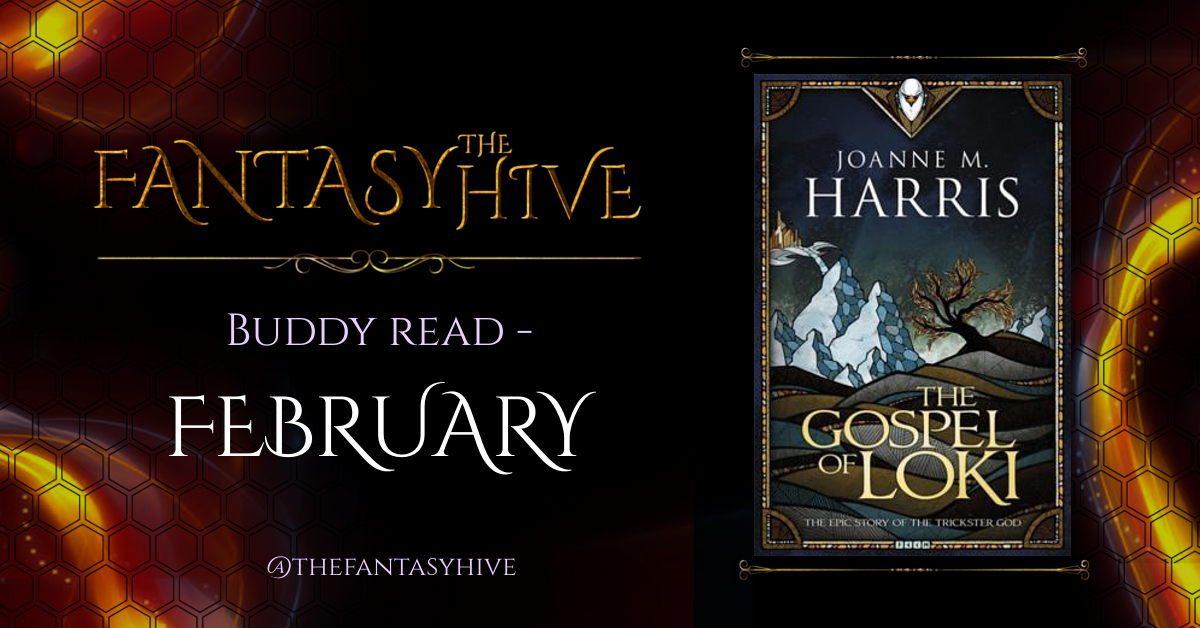
LAURA M. HUGHES: Since we started last month’s read in the same way, and since fantasy cover art is such a big topic of discussion at the moment (*cough* Terry Goodkind *cough* Silly man! *cough*), perhaps we should discuss surface thoughts before we begin.
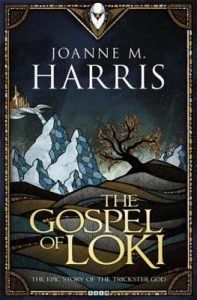
I bought the paperback of The Gospel of Loki a few years ago based solely on seeing the gorgeous, shiny cover on display in a bookstore. (So shallow.) The title drew me in, too, and flicking through the first couple of pages I was intrigued by the short epigraphs featuring witticisms and other quotes from the titular character. I bumped The Gospel of Loki way up my TBR after hearing Joanne Harris speak at Edge-Lit in 2017 – she seems like such a cool lady! (You should follow her on Twitter if you don’t already. She posts very informative stuff about writing and the publishing industry.)
Was anyone else already familiar with the book, or with Ms Harris?
T.O. MUNRO: I had heard of the book. I don’t know why but at first I thought it was something more contemporary picking up the theme of Loki the trickster in a modern setting. I think maybe because I hadn’t heard of Joanne Harris as a fantasy author. I’d seen the film of Chocolat, which threw a slightly surrealist perspective on a small French town where well-judged and chosen chocolate is the solution to any problem (well, maybe not so surrealist). I guess I was expecting “Loki in French chocolate” or something like that. However, at its heart this is a book driven by and revelling in traditional Norse Mythology.
ALICIA WANSTALL-BURKE: The cover… so shiny… I like shiny things… I also like things called Loki. I adopted a Staffordshire Bull Terrier called Loki. He is evil and mischievous and likes to eat cat poo. I’m not sure the last is a trait often ascribed to his namesake, but the first two certainly are.
LAURA: My cat was also called Loki. Thankfully, he never ate his own poo (though he did sometimes stand in it and then trek it around the house… ew).
But yes. The cover is very shiny indeed!
T.O.: On a kindle I don’t get the full benefit of the sparkly/shiny/embossedness of the cover, but it did look good in Alicia’s twisting instagram post. In its design, the cover reminds me a bit of an early Hobbit cover. A simplified/symbolic depiction of geographic features:
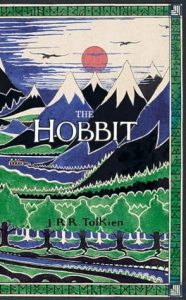
LAURA: Ooh, yes, I can see what you mean. I’m a huge fan of these kinds of stylised covers. And it has the border of runes and everything!
T.O.: My parents’ home had a lovely tome that I used to pore over (Laura, have I picked the right pour, poor, pore, there? (they’re, their, there?)). (LAURA: Yes! Pore. Gold star for you!) It was a dusty yellow covered hardback with black and white plate images and it covered several mythologies. The Norse chapters went through the pantheon of Gods of Asgard and the mythic tales of derring do by its diverse deities. Probably helped drive my love of fantasy.
The Gospel of Loki seems to follow a similar sweeping summary, but each episode is told with Loki’s distinctive voice and perspective, flush with some contemporary allusions and language.
T L GREYLOCK (TAYA): It’s a gorgeous cover. Laura knows well my affection for it. As for the title and the book itself, I was intrigued by it the moment I first heard of it. The Norse-ness speaks to me, which should hardly be surprising. However, I hesitated to purchase it before now and I’m not sure why. I think perhaps it’s because I like the Norse gods (or any gods, really) to remain a bit unknowable–this is certainly how I’ve factored them into my own work. That being said, if this is done well, I know I’ll delight in it.
G D PENMAN: This book is a slightly skewed retelling of the “greatest hits” of Norse mythology with the addition of Michael Moorcock’s Law and Chaos universal dichotomy and a couple of mechanical elements to tie it into the magic system of the rest of the Runemarks series. This isn’t a complaint. These stories were meant to be told and retold, and the storytelling and voice here is pitch perfect.
These stories were meant to be told and retold, and the storytelling and voice here is pitch perfect.
– G D Penman
Most of the “unknowable gods” stuff about older religions comes from Christian scholars’ interpretations of earlier writings. The Norse gods, along with most of the “classical” ones were a little bit too knowable. Particularly Zeus – he would know just about anybody. I really enjoyed the conversational tone of The Gospel of Loki because it took these stories back to the oral tradition in which they were originally shared, instead of the academic language and reverence that got layered on by the Victorians.
TAYA: I guess unknowable isn’t the right word. I’m all for striking a conversational tone, and I’m well aware that the stories of Odin and Zeus often emphasized their human-like natures, but we should also keep in mind that Odin receives wisdom from a severed head, Loki turns into a mare and produces an eight-legged wonder horse, and wolves chase the sun and moon across the sky. These are not very human things and I think it’s the balancing act between human and other that make Odin and other mythological figures interesting.
I’m all for striking a conversational tone, and I’m well aware that the stories of Odin and Zeus often emphasized their human-like natures, but we should also keep in mind that Odin receives wisdom from a severed head, Loki turns into a mare and produces an eight-legged wonder horse, and wolves chase the sun and moon across the sky. These are not very human things and I think it’s the balancing act between human and other that make Odin and other mythological figures interesting.
– T L Greylock
T.O.: The structure and the voice make this a very digestible piece. Loki’s voice, in its self-deprecating faux humbleness and utter immorality reminds me a lot of Mark Lawrence’s Jalan Kendeth in the Red Queen’s War. Ironically, the second book in that series, The Liar’s Key, features a guest appearance by Loki as the original liar and key owner.
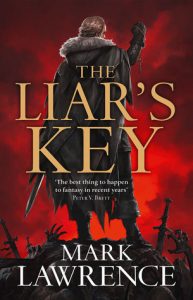 LAURA: That’s a great comparison! Jalan is a bit of a trickster himself, you might say, and The Red Queen’s War does contain quite a few elements of Norse mythology, too.
LAURA: That’s a great comparison! Jalan is a bit of a trickster himself, you might say, and The Red Queen’s War does contain quite a few elements of Norse mythology, too.
ALICIA: I thoroughly enjoy the Marvel Comics adaptation of Loki into their superhero universe, and I liked to imagine Gospel was being read to me by Tom Hiddleston.
I also agree with T.O. – this Loki and Jalan would get on too well! Like a pair of troublemakers out on the town, unreliability narrating their way through every pub, drug den and brothel on the Main Street.
(I should add that my dog’s full name is Loki Jalan Burke, so his bad behaviour is probably expected)
I’m also detecting a slight perfume of the late, great, Terry Pratchett here. It’s lovely.
T.O.: My daughter loves the Marvel films, and especially Thor and Loki’s interaction. I’m not sure I see Tom Hiddleston’s Loki delivering Joanne Harris’s extended Trickster monologue. They’re similar, but just not quite a match. Struggling to think of who I could see playing Loki – there’s a touch of Peter Dinklage’s Tyrion about him – very much in the “I drink and I know things” mold.
ALICIA: You’re right on Hiddleston – I’m just practicing some REALLY wishful thinking! I have worked out that the style reminds me of GOOD OMENS. Every couple of pages I find myself stifling a laugh & trying not to snort tea out my nose.
T.O.: I agree with you about the scent of Pratchett, though. For me, I detect it in the humorous allusions to contemporary society that bleed through the narrative – perhaps less bluntly though than in Pratchett’s case.
Also – and not wanting to pre-empt our December Hive read of Bernard Cornwell’s The Winter King – but there is the same delicious re-interpretation to the point of subversion of some well-loved myths and legends. It’s when a familiar story is re-invented in a slightly oblique way that it becomes differently surprising.
I’m torn between thinking I want to go back to read all the source mythology (or at least talk to Dyrk Ashton about them) to see the links, or wishing I was completely oblivious of the whole pantheon’s stories to experience the book completely fresh. I don’t know which is better – but this could be a book to be read twice/on two levels. Once before and once after internalising Norse mythos.
I’m torn between thinking I want to go back to read all the source mythology to see the links, or wishing I was completely oblivious of the whole pantheon’s stories to experience the book completely fresh.
– T.O. Munro
LAURA: Did anyone else get really excited by just how damn quotable this book is? And am I the only one whose mind was blown by the ‘History = his story’ and ‘Mystery = my story’ early on?
T.O.: No you aren’t – I saw it too and made a note for myself. There are lots of lines I loved. The beautiful twins Frey and Freyja described as “bronze haired, blue-eyed and drawn to reflective surfaces,” Or this one “And so I went through fatherhood like a grain of wheat through a goose, unscathed and unremembered.”
But there was a whole paragraph I wanted to mark because it is so much about the power of words and writing – kinda relevant in this day and age as much as in Norse mythology:
“After all, words are what remain when all the deeds have been done. Words can shatter faith; start a war; change the course of history. A story can make your heart beat faster; topple walls; scale mountains – hey a story can even raise the dead. And that’s why the King of Stories ended up being King of the gods because writing history and making history are only the breadth of a page apart.”
ALICIA: Now that’s poetic. *swoon*
LAURA: It is! I personally liked this one, too: ‘It all begins so hopefully, but these Worlds we build for ourselves are all just castles in the sand, waiting for the evening tide. Ours was no different. Odin knew that. And still, he kept on building. Some folk never learn.’
And, of course, ‘The transition from dog to god is only a revolution away.’
‘It all begins so hopefully, but these Worlds we build for ourselves are all just castles in the sand, waiting for the evening tide. Ours was no different. Odin knew that. And still, he kept on building. Some folk never learn.’
– Joanne Harris, The Gospel of Loki
T.O.: I found a lot of eye-catching quotes right from the beginning, starting with this one (at 3%): “And what makes a hit or a myth, of course is how that story is told, and by whom. “
LAURA: Our Humble Narrator really is VERY quotable! And also strangely sympathetic. Even though it’s clear that he’s the least reliable narrator ever, it’s hard not to feel a connection with him, which inevitably leads to sympathy. Especially in cases where he’s clearly in denial about what he’s feeling. ‘It wasn’t guilt… I wasn’t grieving…’ etc. And even though he brought so much of his misfortune on himself, I did feel bad about the way the gods treated him. Especially with the stitching of the lips!
ALICIA: Those other gods are just a bunch of fucking meanies. *angry face*
TAYA: I’m exceedingly tickled by the fact that Loki is unwilling or unable to admit even to himself that Odin essentially called him into existence. Yes, yes, he existed in Chaos, but would he have ever ventured out into the worlds if it weren’t for Odin?
‘I’d seen that signature in dreams that were bigger and brighter than the rest, and now I could almost hear him, too, his soft and coaxing voice, his words…’
He goes on to make it seem as though he’s done Odin a great favor, stepping out of Chaos (‘To be frank, I felt almost sorry for him…’) and yet it’s a bit the lady doth protest too much.
I’m perfectly willing to announce here that I’m an avowed and unabashed Odin Super Fan. All of my commentary should be read with that knowledge. However, don’t let that fool you into thinking that I’ll only accept glowing interpretations of the Allfather. I do not require him to be all noble and perfect and wise. In fact, I quite like this Odin in these early pages. Hungry. Ambitious. Ruthless. As he should be. Sets up perfectly for all the later tragedy.
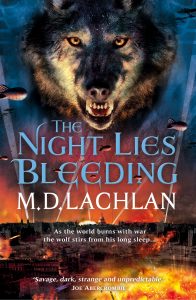 T.O.: I finished The Gospel of Loki and went on to read an ARC of The Night Lies Bleeding by M.D. Lachlan, and suddenly a whole host of characters from The Gospel of Loki showed up and I was like “… I know her!” Not so much the obvious ones like Thor and Odin, but some more obscure characters that I thought Harris might have invented. It emphasises for me both how totally Harris has drawn on Norse Mythos and how fertile the ground is for fantasy writers. (Eh, Taya?)
T.O.: I finished The Gospel of Loki and went on to read an ARC of The Night Lies Bleeding by M.D. Lachlan, and suddenly a whole host of characters from The Gospel of Loki showed up and I was like “… I know her!” Not so much the obvious ones like Thor and Odin, but some more obscure characters that I thought Harris might have invented. It emphasises for me both how totally Harris has drawn on Norse Mythos and how fertile the ground is for fantasy writers. (Eh, Taya?)
TAYA: Definitely. There’s so much within these tales!
ALICIA: I’ve been rather obsessed with mythology since I was a child. My mother bought me a huge encyclopaedia of mythology and I would sit with it for hours reading the stories and pining over the artwork. I was more attached to the Greek and Roman pantheons at first, hence my study of their civilisations at university, but when I learnt that there were other ancient polytheistic mythologies in Northern Europe I was hooked.
Mythology is the original fantasy. It goes deep into our bones, into who we are as people. Our ancient stories, our history, told over and over until a fish becomes a raging sea serpent, a warrior becomes a god, until the history is woven so tightly into legend that the threads are inseparable. That’s what has always spoken to me, when I read fantasy, that it could be our history, or someone’s history, if you just squint your eyes and tilt your head a little bit. It’s really enjoyable to read something so close to the source, though.
Mythology is the original fantasy. It goes deep into our bones, into who we are as people. Our ancient stories, our history, told over and over until a fish becomes a raging sea serpent, a warrior becomes a god, until the history is woven so tightly into legend that the threads are inseparable.
– Alicia Wanstall-Burke
LAURA: Beautifully put, Alicia. In this case, I feel like Our Humble Narrator took a little while to hit his stride, but once he did he was never less than engaging.
ALICIA: Since the chapters on Love and Marriage, I didn’t see a chapter that wasn’t an absolute banger. Some of those one liners were hilarious. Reading it at the hairdresser, I was giggling at Thor in a wedding dress losing his shit and killing everyone at the feast. I know I’m spouting off spoilers like mad but it’s just too funny.
T.O.: I do love the way Loki’s voice punctures the pompous self importance of the gods. Thor is so often not the accomplice of Loki but his stooge – characterised as brave, strong, but to be quite frank – rather stupid. Balder is just uselessly beautiful, and beautifully useless, Frigg is an obsessive cloying mother, Heimdall not the noble guardian of the Bif-rost but a vindictive ball of gold-toothed prejudice, the dubious morality of Freyja (shags dwarves for gold), the dour dull boringness of honourable Tyr the one-handed. It is all deliciously, mischievously inverting.
TAYA: It is inverting–and yet it’s actually exactly what the source material does, especially regarding Thor and Freyja. The Thrymskviða and the Lokasenna are not particularly kind to these two figures. The Nordic people who told these stories to each other (arguments about later Christian authorship aside) clearly weren’t afraid of poking fun at their deities–and who can blame them, given their rather grim, apocalyptic worldview? They needed a little humor in the dark.
G D: I think that Harris has stuck extremely close to the source material with this one, I can only think of one Norse god who is absent, and his role has been divided up amongst the others quite neatly. She relies on our own values’ dissonance with these older ideas of honour and righteousness to provide a lot of the humour. Having our humble narrator use a few anachronisms helps to add to this idea that Loki is “one of us” and the gods are a “them.”
Having said that, I think it is interesting how heavily Harris leaned into the angle that the Norse Gods are jocks, bullying the poor nerdy Loki just because he was clever. A decade or so ago, that would have fit the zeitgeist nicely, but now it seems to run a bit contrary. A book aiming to persuade its readers with a twist on the old narrative but a near miss on the modern perspective seems entirely in character for Loki, although I may be giving Harris slightly too much credit, just because the book was so much fun.
TAYA: Really interesting thoughts on the nerds vs. jocks, especially because these days, the success of Marvel has made it ‘cool’ to like superheroes and mythology and comic books–and Loki’s character in the Thor franchise certainly has played a large part in that. Casting Loki as the ‘nerd’ doesn’t have quite the same bite as it once would have.
T.O.: You’ve got me curious, G.D. Which Norse god is absent? Also – yes, there is a nerd versus jock angle here. Loki the underdog and whipping boy who bites back.
G.D.: Vidar the Silent has had his title passed off to an uncle and his role in Ragnarok handed off to Thor. It was probably a smart move on Harris’ part, I can’t really remember any other stories that he showed up for.
Loki’s voice punctures the pompous self importance of the gods. It is all deliciously, mischievously inverting.
– T.O. Munro
LAURA: As someone who began this book knowing very little about Norse mythology beyond what I’ve picked up from the MCU, I’m personally quite glad there weren’t any more gods I had to try and keep track of! That said, I’d happily read more of Loki’s exploits, be they prequels, sequels or expansions of the stories in here.
T.O.: I just went to Goodreads to find that the Gospel of Loki fits into the oddly numbered Runemarks series
The Gospel of Loki (Runemarks #0.5)
The Testament of Loki (Runemarks #0.6) to be released in March 2018
Runemarks (Runemarks #1)
Runelight (Runemarks #2)
Makes me wonder if there will be a Revelation of Loki (Runemarks #0.7) etc?
ALICIA: THERE’S MORE?!?!?
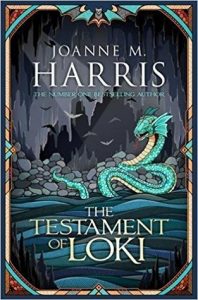 LAURA: I didn’t realise Loki was connected to the Runemarks series either, Alicia! I figured it was a standalone. You’re spot on, T.O. – The Testament of Loki is listed as being released on March 20th, 2018! Look at it! It’s so pretty! Going to have to invest in a physical version of this bad boy for sure.
LAURA: I didn’t realise Loki was connected to the Runemarks series either, Alicia! I figured it was a standalone. You’re spot on, T.O. – The Testament of Loki is listed as being released on March 20th, 2018! Look at it! It’s so pretty! Going to have to invest in a physical version of this bad boy for sure.
Ahem. Any more thoughts about Gospel before we start getting all excited about its sequel?
TAYA: Returning for a moment to the style of the book and Harris’ narrative choice, while I enjoyed Loki’s voice and narration, I never lost track of the fact that I was being told a story. Hopefully that makes sense to someone else, too…. To elaborate, I think the best books that employ this technique should be able to make you forget that you’re being told something; you should be in it, living and breathing it.
LAURA: I know what you mean, but I’m not sure I agree. I’ll admit I found the voice and direct address a bit jarring at times, but I suspect that’s very much deliberate. While I would have preferred it to be more immersive (the way Benedict Patrick includes fairy tales in his Yarnsworld series, for example), I actually rather liked the fact that we can’t forget we’re being spun a very careful and deliberate yarn by a character who is, shall we say, less than reliable. But that’s a matter of taste, and I can completely see why it wouldn’t work for others.
GD: Did anyone else find it a strange that the narration was a bit sexist? I understand that Harris was trying to convey a male voice for Loki, but given that he was supposed to be a being of pure chaos who frequently switched genders and species on a whim, it seems a bit odd that he was a misogynist?
TAYA: I saw this comment before I started reading (oops), but I tried not to let it sway me too much. Having finished, though, I have to echo this question. Loki portrays the goddesses as a fairly unremarkable lot, often grouped together in a twittering mass of women gossiping about an attractive man. To be fair, I think Loki launches a good share of insults at the male gender, too.
LAURA: Interesting. The misogyny didn’t stand out much for me, probably because – as Taya says – the narrator refers to everyone in much the same scathing way. I know what you mean, though – especially with his lack of respect for the likes of Idun and Sigyn in particular. I’d still say he’s a misanthrope rather than a misogynist, though. I think.
Any comments about the big finale before we finish up? What did everyone think of the denouement?
TAYA: After all the build up, the ending came quickly, perhaps a bit too quickly. Did anyone else get the same sense?
LAURA: Very much so. While I enjoyed it, and thought the build up was rather brilliant, I couldn’t help but feel disappointed that there wasn’t another chapter filling in what happened after the fall from the Bif-rost.
T.O.: Oh, yes – the subtle niceties and not-so-niceties of Ragnarok demand a fuller treatment… possibly an operatic one lasting several days. Anyone for Wagner?
TAYA: ME
I’ll admit that perhaps some of my quibble here is due to the fact that I noticed some parts of the Ragnarok story were missing, including one of my favorites: it is not Thor who avenges Odin after Fenrir swallows the Allfather; it is Vidar, Odin’s silent son, the god of vengeance, who does so. The Poetic Edda has him merely stab Fenrir in the heart, but the Prose Edda tells us that Vidar has spent his existence preparing for that moment by crafting a very special shoe with a leather sole painstakingly pieced together, layer upon layer, using the scraps of leather thrown away by men and women as they trim their own shoes. After Odin’s death, Vidar steps onto Fenrir’s lower jaw with his thick-soled shoe and proceeds to rip the wolf’s jaws apart. I mean…that’s pretty cool.
LAURA: That’s… also kind of weird. I’m starting to see why Harris left this character out after all…

LAURA: Finally, let’s move on to our RECOMMENDATIONS! Here, we’ll suggest books similar to The Gospel of Loki.
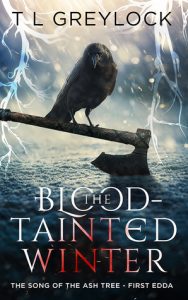 In terms of books featuring Norse mythology, I myself heartily recommend both Cold Counsel by Chris Sharp and The Blood-Tainted Winter by our very own T L Greylock (Taya).
In terms of books featuring Norse mythology, I myself heartily recommend both Cold Counsel by Chris Sharp and The Blood-Tainted Winter by our very own T L Greylock (Taya).
TAYA: Stop it, you’re making me blush.
LAURA: Fine, fine. Everyone, DON’T read The Blood-Tainted Winter by T L Greylock. (But really, do.)
T.O.: The Night Lies Bleeding proved to be a real complementary book to The Gospel of Loki. It all got a bit meta-fourth wall for me, as I found characters slipping through and between the pages of the two books in the same way that Loki moves between and through the world of dreams, of Hel and the real Nine Worlds.
G D: The obvious place to start if you want more EXACTLY like this plot would be the prose and poetic Eddas, although the language can be a little tricky to get to grips with. For a more fantastical, but still somewhat dusty approach, you can jump ahead to Tolkien’s Legend of Sigurd and Gudrun. For character flavour, I feel like Harris leaned most heavily on Gaiman’s American Gods and Sandman interpretations; and I hear he has a collection of Norse myths out now too that could be a good entry point.
My personal favourite Norse fantasy book is probably still Poul Anderson’s The Broken Sword, it captured the essence of a mythic tragedy without sacrificing brevity in the storytelling. Bit sad though. Failing that, you can hardly walk into a bookshop without tripping over a heap of Norse inspired fantasy books. Finding books without a Norse influence, via Tolkien, would be considerably more difficult.
TAYA: Giles Kristian’s Viking books are a lot of fun. It’s been a while since I picked one up and I actually haven’t gotten to the last yet, but if you like Viking and Norse stuff, you really can’t go wrong.
T.O.: Having long ago lost that dusty book of mythology, I was forced to dig out my old copy of AD&D Deities and Demigods to get a fix of Norse Mythological reference material:
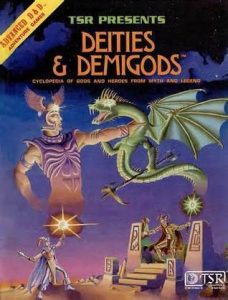
Though I don’t think these illustrations (or stats) quite do justice to the image Joanne Harris conjured in my mind.
ALICIA: Sorry, what was that? Was watching Thor: Ragnarok for the 40,000th time.
*Ahem* Our humble narrator makes an appearance in Mark Lawrence’s Red Queen’s War trilogy (as does Fenrir/Fenris, if my memory serves correctly).
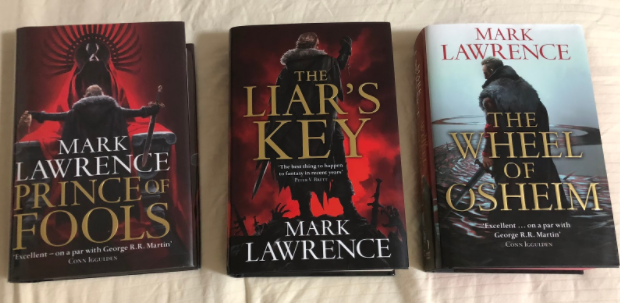
Oh, and this is part of the entry on Loki in my mythology encyclopaedia, with a wonderful piece of artwork that relates directly to a scene in the Gospel:
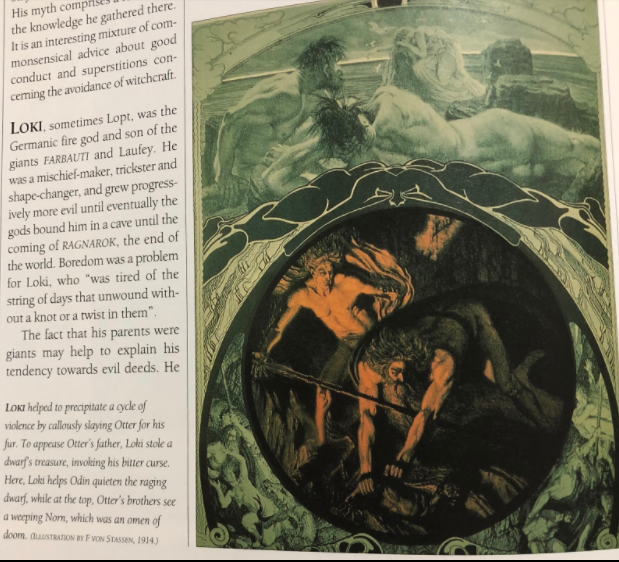
No, I’m not a massive mythology nerd AT ALL!
LAURA: I think everyone will agree that around here – and in this discussion in particular – being a massive mythology nerd is a very fine thing indeed, my dear!

Thanks again to our wonderful reading team of Alicia, T.O., Taya and G.D. And me (Laura), I guess. Be sure to stop by next month to see what we have to say about Stranger of Tempest by Tom Lloyd!
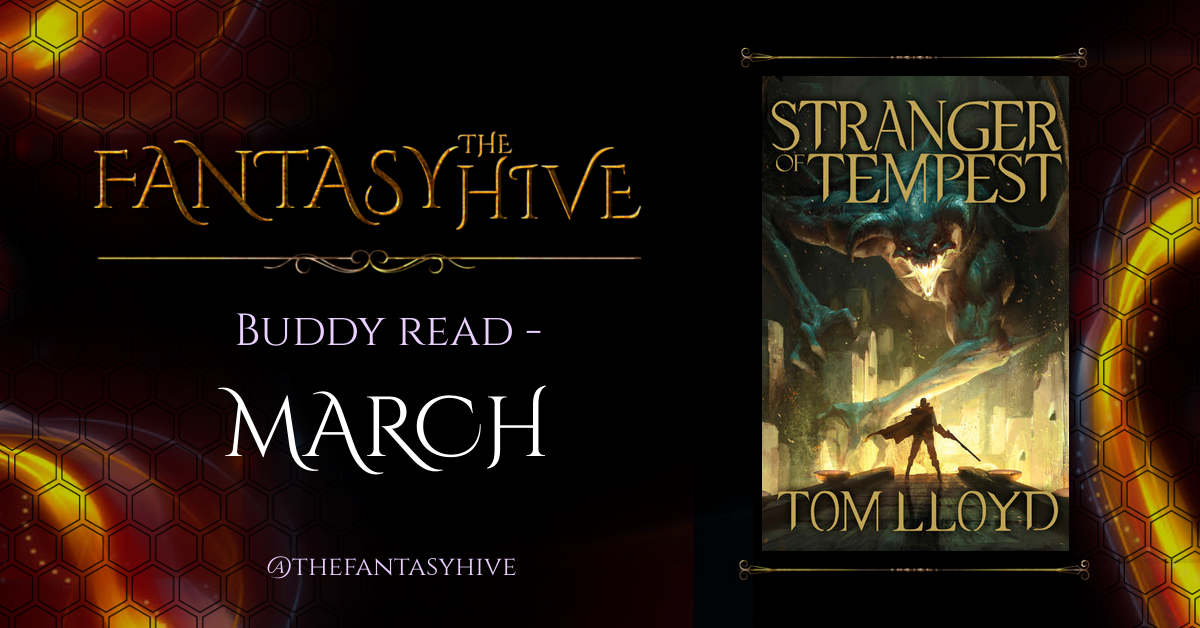

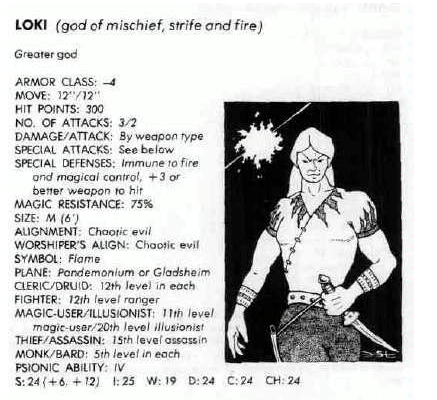
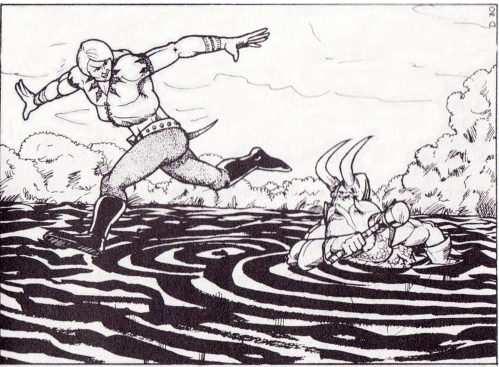
[…] of us here at the Hive first came to your work with a Hive group read of The Gospel of Loki and we loved the acerbic wise cracking genius of Loki. But this quote particularly struck […]